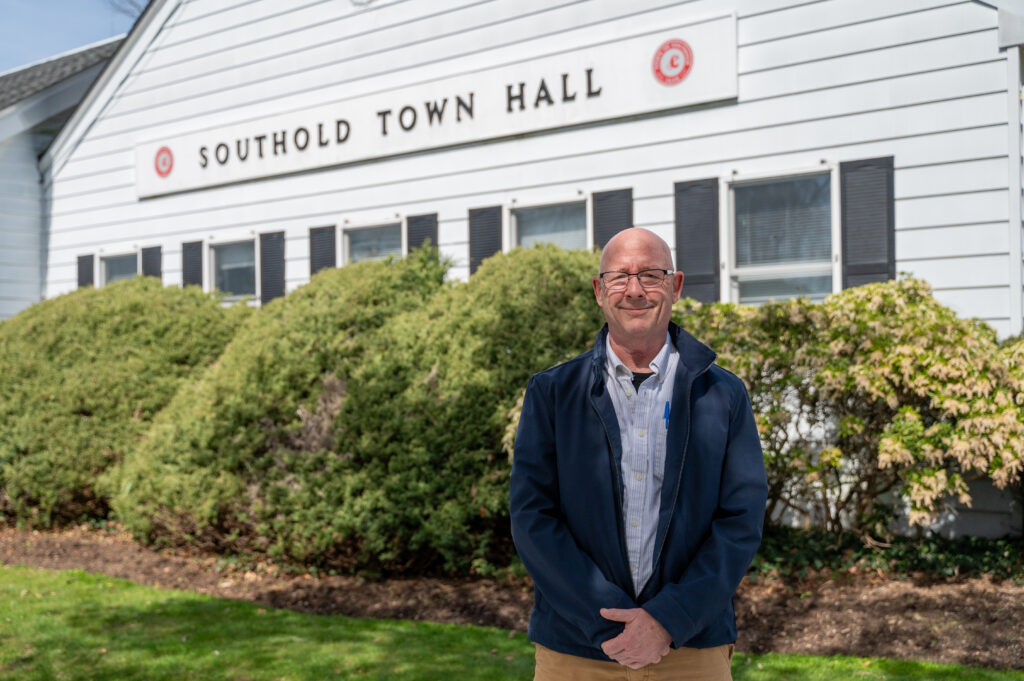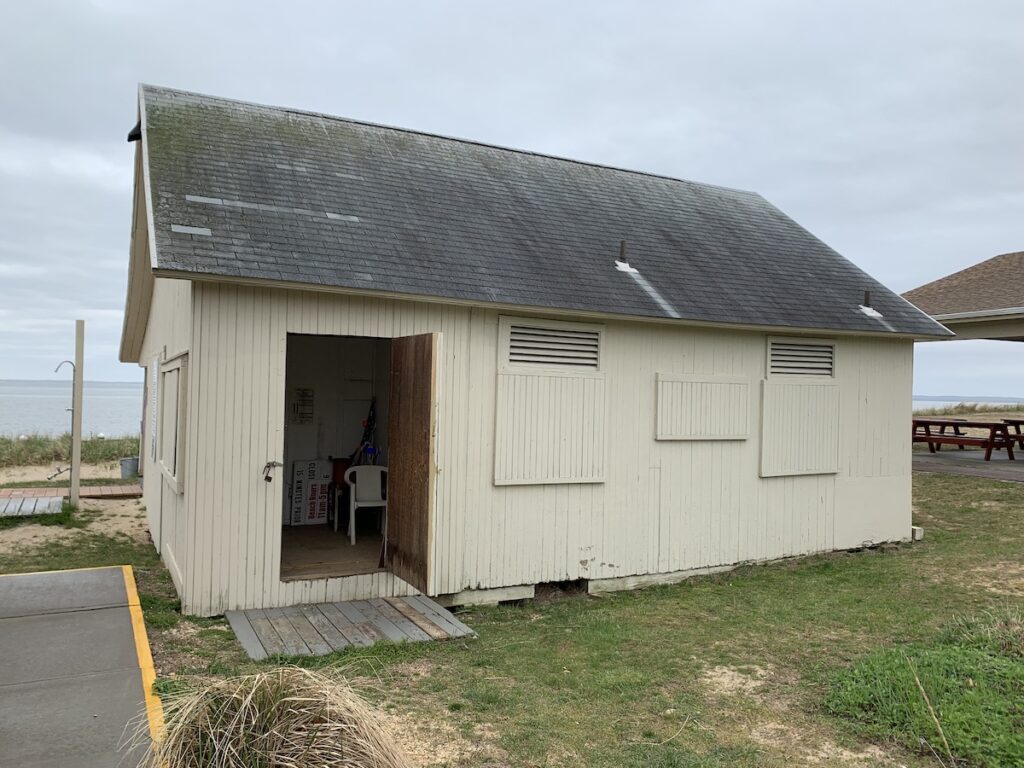What comes next for Greenport’s Arcade? Once a fixture, but vacant for so long

When David Levine was a teenager, he enjoyed his afternoon shifts at the Arcade Department Store, often working alongside his best friend, Jack. The two would spend their time at the bustling Front Street establishment helping housewives shop for dress patterns, farmers stock up on Red Wing boots and tourists peruse the packed aisles for bathing suits and beach umbrellas.
“This was a small town, everyone knew each other,” said Mr. Levine, whose grandfather founded the Arcade, and whose father, Arthur, later took over. “It was the kind of place where, when we had our annual Christmas party, we would close up early, but if anyone stopped by, my dad would just invite them in for a drink.”
For more than a century, the Arcade was a community anchor, serving locals and visitors alike who came in search of everything from Band-Aids to balloons. But in recent years, the store, between Main and First streets, has stood silent, its large, conspicuous windows featuring dusty displays of antique tea sets and Victorian glass bottles; soda machines with Cokes still stacked in rows; and an eerie panorama that includes an old doll, a lime green leotard, a piggy bank and a stone paperweight with the word HOPE inscribed in black ink.
Not everyone is happy with the current situation. “The Arcade has been closed for a long time and the owners need to do something with it — or sell it to someone who will,” said Greenport Mayor George Hubbard Jr.
“It is almost fundamentally a teardown.”
Eileen Wingate
The fate of the Arcade has been something of a question mark for years. In 2017, an early morning raid at the building uncovered several men living illegally in cramped, unventilated rooms above the store. The Arcade was shuttered, and has remained mostly closed ever since. The owner, David Akcay, has tried to lease out the business over the years, but has yet to find any takers. Mr. Akcay, who also owns a liquor store on South Street and several other properties in town, has not put the building itself up for sale. Mr. Akcay could not be reached, and a representative for his family said that it was waiting for the pandemic to end before making any decisions on the future of the site.
There is not much anyone can do to force Mr. Akcay to reopen the Arcade or redevelop the building. “Our hands are tied since we don’t have the money to buy the property ourselves,” said Mr. Hubbard, “but we would love to help anyone who is interested with zoning and planning assistance.” The mayor would like to see the two-story structure, which has close to 7,000 square feet, divided into several smaller retail spaces.
The nearly 100-year-old building has not been renovated in many years, said former village building inspector Eileen Wingate. “It’s in terrible shape; it’s a structural mess. It is almost fundamentally a teardown.”
The Arcade was a Greenport institution for generations. Founded by Samuel and Julius Levine, two Jewish brothers who immigrated from Lithuania, it opened in 1928. The pair also owned a grocery on Main Street. “My grandfather and great-uncle opened the Arcade and Levine’s Market, a small food market,” Mr. Levine recalled. When Samuel retired, his son Arthur, who also served as a two-term mayor of Greenport, took over the Arcade; Julius’ son Leo took over Levine’s market. When Arthur died in 1996, his children sold the building.

The Levines sold the Arcade to Bob Paquette, a self-described Greenport carpetbagger who was living in New York City at the time and working at a radio station there. “I was out for the July 4th weekend, and I saw an article in the paper about how the Arcade was going out of business,” Mr. Paquette said. “I figured, ‘Why not?’ ”
Mr. Paquette had grown up working at his own father’s five-and-dime store in Maine and was excited at the prospect of the business. “That first year was hard, but by the second year, we figured out what worked, and the store was doing over $2 million in sales,” he said.
Under Mr. Paquette, the Arcade did a relatively brisk business — until the 2008 recession. “We used to do as much in December as we did in July, but that December we went from $290,000 to $75,000, which is what I used to do in February. And my February — forget it. It went down to $35,000,” he said. “I just couldn’t keep it working.”
Mr. Paquette, who is sometimes known as “one-eyed Bob”— he lost an eye in a BB-gun accident as a child and used to wear an eye patch (he now blacks out one lens of his glasses) — switched up his inventory and reopened the store. The revamped retailer was called “One-Eyed Bob’s Clearance Center & Discount Emporium.” That didn’t work either and soon closed.
But in 2012, as the bank was about to foreclose on the business, Mr. Paquette struck a deal with Mr. Akcay, who agreed to take the struggling operation off his hands. Mr. Akcay paid off the bank and agreed to give Mr. Paquette monthly mortgage payments, which are set to finish later this year. He even rented Mr. Paquette an apartment above his liquor store on South Street. “They are like angels to me,” Mr. Paquette said of Mr. Akcay and his family.

But while Mr. Akcay was a savior for Mr. Paquette, his ownership of the Arcade has been far more fraught. In particular, the 2017 raid that found several tenants illegally living in the commercial building has drawn criticism. “It was outrageous,” said Ms. Wingate, the former building inspector. “I recall one bedroom had two tiny cots and no window, with clothes hanging from a rod and a heating system, like an exposed duct, just running through the space.”
The tenants were each paying $1,500 a month for a room. Mr. Akcay was originally charged with 26 code violations but, in the end, pleaded guilty to seven and paid a $5,000 fine. While the owners admit to renting the space, they say they were trying to help the workers, who otherwise would have had a hard time finding housing.
As for the Arcade’s future, if it were to remain a retail establishment, it would face several challenges, including competition from the big box stores in Riverhead, a dearth of full-time residents in Greenport to sustain it in the off season and changing local tastes.
“When I bought the Arcade, Front Street was like Baltic Avenue and Main Street was like Atlantic Avenue — the cheapest real estate in Monopoly,” said Mr. Paquette. “Now it’s like Boardwalk and Park Place. Prices have gone up and people have money to spend. They’re not going to shop at a store like the Arcade anymore.”
Mr. Levine agrees: “That place ceased being the Arcade a long time ago. I hope that whatever opens there next has a new name, with a fresh start.”








